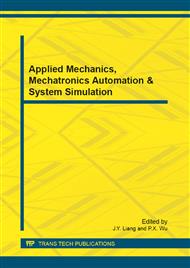p.1599
p.1603
p.1609
p.1615
p.1621
p.1627
p.1632
p.1638
p.1646
Distributed Optical Fiber Raman Signal Noise Cancellation Based on Empirical Mode Decomposition
Abstract:
The distributed optical fiber Raman sensor system was widely used for real-time measurement temperature, but the Anti-Stokes and Stokes scattering Raman signal is very weak. In order to improve measurement accuracy the signal must be denoised before obtaining the temperature. In this paper, a new noise cancellation of empirical mode decomposition is proposed for enhancing signal-to-noise ration of the Anti-Stokes and Stokes scattering Raman signal. The signal-to-noise ratio was enhanced by using this method and it is easy to be realized in computer.
Info:
Periodical:
Pages:
1621-1626
Citation:
Online since:
September 2012
Authors:
Price:
Сopyright:
© 2012 Trans Tech Publications Ltd. All Rights Reserved
Share:
Citation:


